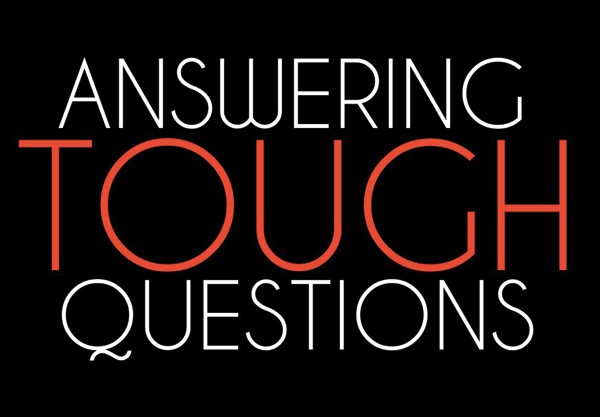Every day I talk with students who ask nearly impossible questions about Jesus, Christianity and the Bible. I don’t have all the answers (and I never will). Thankfully, that’s not what God requires of Christians to share our faith.
This isn’t a perfect process, but it is a way to equip yourself in answering questions like “How can we trust the Bible?” and “Was Jesus really God?”
Instead of answering specific questions, I’d rather share ways to prepare to answer tough questions and pass along a few resources you can start checking out today.

The Process
1. Read the Bible
If we believe the Bible is the only completely inerrant book ever written, it would probably be a good idea to get familiar with it. The more I read the Bible, the more answers I find to questions, and the more confident I am that it is the true Word of God.
As Hebrews 4:12 says,
For the word of God is living and active, sharper than any two-edged sword, piercing to the division of soul and of spirit, of joints and of marrow, and discerning the thoughts and intentions of the heart.
The word of God, the Bible, is alive, and it can guide us to the best answers about God.
2. Ask God for Wisdom
James 1:5 says,
If any of you lacks wisdom, let him ask God, who gives generously to all without reproach, and it will be given him.
That’s a great promise to cling to. God gives us wisdom when we ask.
When I’m in a conversation and I don’t know the answer, I ask God to give me wisdom. Sometimes an answer or analogy comes to me that I’ve never thought of through God’s Spirit, sometimes I come up with an answer later, and sometimes I don’t come up with a great answer at all (which we’ll get to later).
3. Talk with Christian Friends
Your friends are probably all at different stages of their faith journey, but they probably all had different questions throughout their walk with God. When I meet a tough question I don’t have a good answer to, I talk about it with friends who can help me think through answers.
4. Research
The Internet is an amazing resource (although I once read on the Internet that you cannot trust everything you read on the Internet).
There are countless Christian blogs, podcasts and YouTube videos that can help you answer your questions.
A few of my favorite resources are:
- **Desiring God**The first place I go to see what one of my favorite pastors and teachers, John Piper, says about my questions.
- **The One Minute Apologist**The quick videos on this YouTube channel are helpful.
- **EveryStudent.com**A Cru website with a bunch of solid articles on faith in Jesus.
5. Read Solid Apologetic Books
Mere Christianity by C.S. Lewis and The Reason for God by Tim Keller are a couple of my favorite books because they do such a good job of explaining the rationale behind our faith and provide tons of analogies.
Really smart Christians think about really hard questions and then write books about the answers. That’s great news for us.
6. Say, “I Don’t Know”
This is one of the most disarming things you can do in a conversation with someone. No reasonable person can expect you to have the answer to every question they toss your way. If you don’t know, feel the freedom to say so and tell them, “I’ll look into that and get back to you.”
Turn to the above five suggestions and I’d say there’s a really good chance you’ll come up with a fine answer.
It’s also a winning approach because it gives you an opportunity to continue the conversation about faith later.
7. Accept by Faith
We will never have the perfect answer to every question we have about faith. That’s what makes it faith.
We all come to a certain point where we have to step out from the dock onto the boat. That step is faith.
For some of us, we have to get the boat closer than others. Some people are just naturally blessed with a greater inclination towards faith.
That’s not a cop-out to say, “Just believe” and have no answers. It’s a statement that frees us from having to know exactly why God does everything the way He does and simply trusting that He knows best.